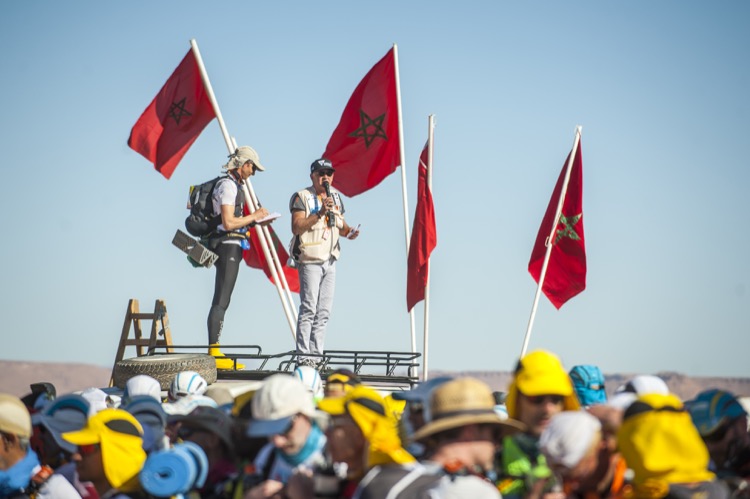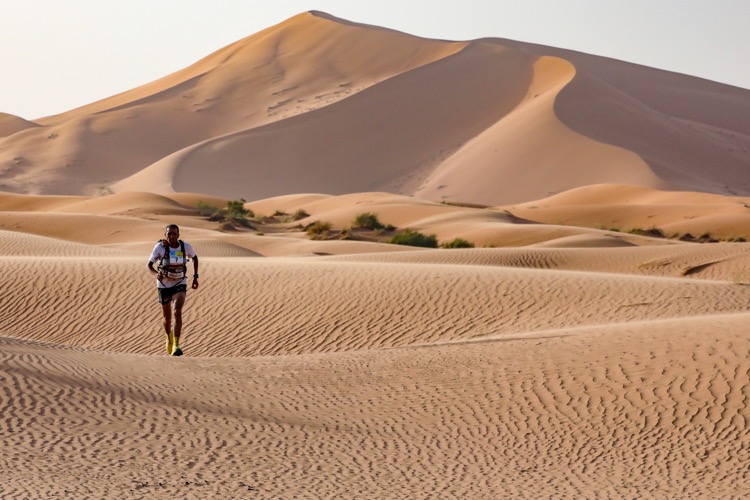Photos © Erik Sampers, Josuef Photo, Marta Bacardit, Valentin Campagnie
The way the 35th Marathon Des Sables handled its cancelation was disturbing, if not bluntly upsetting. Early this year, on March 7, Patrick Bauer—creator, owner and race director—informed every participant about his event’s postponement. The race has happened every year in April since 1986, and in 2020, had been planned to go from April 3–13 in the southern part of the Moroccan Sahara. The race, the email said, was being rescheduled for September 18–28, 2020. At the time, the current global pandemic had already reached a damaging, cruising speed. A lot of events were rightly getting canceled everywhere, while others were being postponed. As things progressed, confused and frustrated participants on social media were understandably getting agitated. Was the race really going to happen? Shouldn’t Bauer and his team simply cancel it and hope for better times in 2021? The situation was hard on everyone. To understand why the Marathon Des Sables 2020 wasn’t canceled earlier and discuss 2021, we recently talked with Patrick Bauer.
URM: Patrick, from our perspective, it’s fair to say that you took a while before understanding the race wouldn’t happen at all in 2020. Your event has a very complicated setup, but it takes place in less than ideal sanitary conditions. Over 1,200 runners have seven days to go through six stages and 155 miles of desert landscapes. From giant sand dunes to dried-out riverbeds, stony fields and small mountains, with temperatures almost always higher than 100 degrees. Participants carry everything they need for the week, except water, as it is being given to them every day in the morning before the start, or at each aid station. In their challenge, they’re helped by 450 support staff, including 60 medical personnel. There are also two helicopters in the sky at all times, and a few camels on the ground, not to mention more than 500 local Berber tents. Before canceling the race, what did you have in mind to preserve people’s health?
 PB: When we decided to cancel the race, the borders with Morocco had remained closed for a bit, and we had no guarantee they were going to re-open anytime soon. Most of our participants fly from Paris in one of the three planes we rent for the occasion. But even reaching France was going to be hard for a lot of our foreign participants. There’s 70% of them in the peloton. Consequently, the race would have only seen participants from France and Morocco, and that wasn’t fun or viable economically. To step away from this anxiety-inducing climate, I’ll only say one more thing: we had all the safety procedures in place. Our goal was to make you, the participants, and the media coming to the event, as well as our staff, of course, feel safe and confident.
PB: When we decided to cancel the race, the borders with Morocco had remained closed for a bit, and we had no guarantee they were going to re-open anytime soon. Most of our participants fly from Paris in one of the three planes we rent for the occasion. But even reaching France was going to be hard for a lot of our foreign participants. There’s 70% of them in the peloton. Consequently, the race would have only seen participants from France and Morocco, and that wasn’t fun or viable economically. To step away from this anxiety-inducing climate, I’ll only say one more thing: we had all the safety procedures in place. Our goal was to make you, the participants, and the media coming to the event, as well as our staff, of course, feel safe and confident.
URM: We understand the Marathon Des Sables is your unique source of revenue. But since many other essential races had been canceled weeks ahead of yours, if not months, we somehow got the feeling that you wanted to maintain the race at all costs, possibly putting the health and safety of the participants at risk. What do you have to say about that?
PB: My decision took some time because all the uncertainties related to COVID have created a very toxic and stressful climate. Only two weeks before we took the call, anything was possible, at least from our view. The next edition will now happen from April 2-12, 2021. Believe me, I now get to sleep again. My energy is in the right place.
URM: Will all 2020 registered runners be granted a spot in the 2021 event? Or will they be reimbursed if they decide they can’t come? What rules have you set in this regard?
PB: I would imagine that most participants would want to come next April to celebrate our 35th anniversary. Those who can’t be with us in the desert can now postpone their participation to 2022 or even 2023.
URM: Oh, wow, that’s very impressive. That seems quite fair indeed. And of course, some people will complain that you can’t just reimburse them, but we can understand your needs and perspective as an organizer, too. Hopefully, among all the negativity and the destruction that coronavirus brought to us in 2020, there will be positive things to remember. What are the positives in this significant crisis?
PB: You’re right. There are some positives. I contracted COVID, and so did my mom. We were able to spend more time together, and we came out of this closer than we’ve ever been. We both kept in touch with our relatives through video calls. We shared our fears, and we received more than we thought we would. There was a lot of love between us during that time, and it was a beautiful thing. While on standby from work, we were also able to define new life objectives and new thoughts about our lives while focusing on the present.
URM: We watched your web TV, Waiting for MDS, at the time when the race was supposed to happen, and it was a way to keep us all together. You also sent socks with a note to every one of your registered participants, and it was a nice little gesture. You’re a man of good heart, but sometimes, some of your business decisions have not been the best. We’re referring to the sale of the name Marathon Des Sables to a company that became a competitor and organized similar events, but with half the distance. You’ve explained many times how you are entirely unrelated to them now. So let us ask you this question again one more time: did you wait too long before canceling your event?
PB: Listen, I thought about the runners more than ever during the few weeks leading to our cancellation. We could see what was being shared on social media everyday. We could see their hopes, their training, their despair and their frustrations. I know that a lot of you wanted me to talk sooner than I did. But my team and I had to analyze the situation with great care. MDS is supposed to be about having a party in the Sahara. It’s about solidarity and safety for all. In the end, you can think about what you want, but I want to take this opportunity to thank all registered runners from the bottom of my heart. They trusted us, they believed in us, and they loved us. It showed. They understood that it wasn’t an easy time for us, nor was it an easy decision. We are missing them. The Moroccan Sahara is missing them. But we will make sure this 35th anniversary of the race next year will meet everyone’s expectations. I love you guys.
URM: All right, thank you, Patrick. You’re such a sweetie. We wish you the best for 2021! See you there.





3 comments
Beautiful race I’ve never competed in really glad so much thought & care is still bestowed on it .( 86 States & Wasatch 100 winner ).
Nice experience 🙂
as a 6time finisher I will be competing in 2024 again at the age of 60. “we all need some desert from time to time” 🙂
Comments are closed.